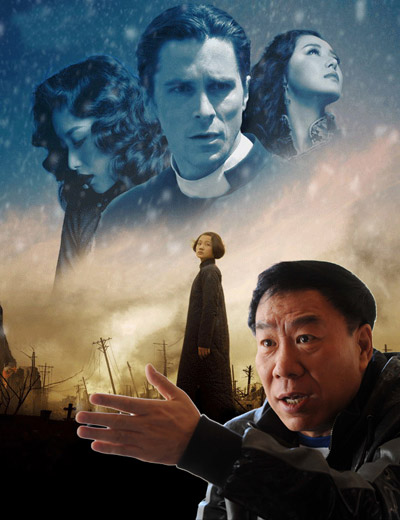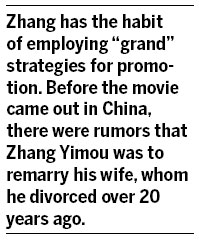The blame game
Updated: 2012-03-04 16:51
By Raymond Zhou (China Daily)
|
||||||||
 |
|
Zhang Weiping, producer of Zhang Yimou's The Flowers of War, blames Hollywood and the United States press for "Nanjing Massacre denial". China Photo Press |
Zhang Yimou is humble and sincere, but the man behind him delivers an Oscar-worthy performance of the bad cop, again.
Zhang Yimou may be the biggest filmmaker in China, but his producing partner, Zhang Weiping (no relation to the director) is extremely good at something else, namely spreading around culpability.
Recently, producer Zhang launched into a tirade against Hollywood and the United States press, essentially accusing them of "Nanjing Massacre denial".
In a series of media interviews, Zhang said that because "many Japanese denied the Nanjing Massacre, and two of the biggest film studios in Hollywood are owned by Japanese, Hollywood naturally identified with the Japanese view and concluded that The Flowers of War does not respect history, but is based on fabrication."
He specifically mentioned the review by The New York Times, which was published on Dec 20, 2011, as "changing the tide of public opinion in the West". In previews before that, he claimed, the film was "warmly embraced".
Government darling?
Zhang Weiping reasoned the West got its preconceived notions about the film from three sources: Zhang Yimou directed the Beijing Olympics show, the film got a loan from a State-owned bank, and had its premiere in a government building.
Of course, none of that determines it has to be a government-funded film. While all movies produced in China have to be government approved for content, not all are made by the government or government-owned entities.
But is it true that the perceived government association with Zhang Yimou's new war epic undermined its box-office performance in the US?
From what I have read, US press coverage of the film indeed showed some anxiety about the subject matter - whether it might be too "jingoistic" or whether it embodies some kind of government agenda. But once the critics saw the movie, it was pretty clear that what they did not like was the style rather than the content.
The story itself, while highly melodramatic, has a kernel of truth as it was recorded in the personal journal of Minnie Vautrin, the American missionary educator who saved many Chinese refugees from Japanese brutality.
Mike Hale, the New York Times film critic, wrote: "It's a contrived, hothouse state of affairs, summed up in a scene Mr Zhang likes so much that he repeats it: the laughing prostitutes sashaying across the churchyard in slow motion, oblivious to the impending tragedy. There will be tragedy, of course, though when it comes it takes a weirdly oblique form."
Well, some Chinese blogger pulled out many reviews from the US press and compared them with Zhang's accusation. The result is not only discrepancies, but outright contradictions. It's safe to say that while Americans do not love the massacre topic as much as they do the Holocaust, they made it a point that it's Zhang's film they did not care about.
It probably did not help either that the veteran director is no longer the art-house "dissident" whose work was constantly censured by the establishment.
But it shows producer Zhang's desperation and lack of finesse to over-politicize the reception of their film, especially associating it with serious denial of the massacre by some Japanese politicians.
Secretions of bitterness

Zhang Weiping is prone to hyperbole. Before the release of Flowers, he claimed that it would gross 1 billion yuan ($158.73 million) in domestic box office revenue and 200 million yuan ($31.75 million) in North America. He ended up with 630 million yuan in the home market and $250,000 Stateside as of February, 2012.
You can say he had high hopes and it is human nature to look on the bright side.
Zhang has the habit of employing "grand" strategies for promotion. Before the movie came out in China, there were rumors that Zhang Yimou was to remarry his wife, whom he divorced over 20 years ago. The film before that came with the opportune surfacing of early private photos of the director and Gong Li, his long-time beau and muse, but since separated for a dozen years. Nobody could tell whether director Zhang consented to such marketing gimmicks, but they probably worked wonders - as expected - or why did he (or the marketers he hired) keep using such tabloid-style schemes?
Zhang Weiping's company, China New Pictures Film, is strictly a one-trick pony, hmm, I mean one-director operation. If a project bombs, there is nothing to offset the loss, or send the blame elsewhere. And by "elsewhere", it means everywhere except the producer and the director.
For example, producer Zhang blamed Bill Kong, his long-time producing partner, for chickening out of Flowers of War. He reprimanded Christian Bale for "hurting the movie rather than helping it". Previously, he also disclosed that he paid the Hollywood star $20 million, a move that ran contrary to professional secrecy. (Shouldn't Bale have helped its American exposure by doing something that the Chinese government hated, I wonder?)
But Bale should not feel too bad about it. Zhang did say a lot of nice things about him before Flowers opened. Besides, at the time of Curse of the Golden Flowers, the producer hung out a laundry list of "bad behavior" by its star, Chow Yun-fat.
More surprisingly, Zhang Weiping admitted to full understanding of the risks of this undertaking, including its political risks. So, he should have known what would happen later, right?
As I see it, Zhang is not a gracious loser.
Film is a risky business. You do not know what people will like at a certain time. They may swarm to World War II movies one year and become totally apathetic the next. That makes moguls like Harvey Weinstein true geniuses because they are able to predict - with a higher degree of accuracy - what audiences will swoon over two or three years from now.
On top of that, it is ludicrous to place high hopes on Oscar recognition as a launch pad into the North American market. As has been shown in the past decade, the Best Foreign Language category has an aversion for big-budget epics. And even if it wins the award, it may not boost its box office in any substantial way, as has happened to many winners such as No Man's Land.
Zhang Weiping has the chutzpah of Harvey Weinstein or Louis B. Mayer, but he does not possess their artistic visions. He supports the director without giving him the necessary input of a true film impresario. Of all the people who should take some responsibility for the less-than-stellar turnout, the producer should be the one to say, "The buck stops here." That means self-reflection about both the business and artistic decisions of the enterprise.
By the way, whining like a baby will not help the director's future projects in terms of international cooperation. Who would want to be the next target of Zhang Weiping's wrath?

 'Taken 2' grabs movie box office crown
'Taken 2' grabs movie box office crown
 Rihanna's 'Diamonds' tops UK pop chart
Rihanna's 'Diamonds' tops UK pop chart
 Fans get look at vintage Rolling Stones
Fans get look at vintage Rolling Stones
 Celebrities attend Power of Women event
Celebrities attend Power of Women event
 Ang Lee breaks 'every rule' to make unlikely new Life of Pi film
Ang Lee breaks 'every rule' to make unlikely new Life of Pi film
 Rihanna almost thrown out of nightclub
Rihanna almost thrown out of nightclub
 'Dark Knight' wins weekend box office
'Dark Knight' wins weekend box office
 'Total Recall' stars gather in Beverly Hills
'Total Recall' stars gather in Beverly Hills
Most Viewed
Editor's Picks

|

|

|

|

|

|
Today's Top News
Health new priority for quake zone
Xi meets US top military officer
Japan's boats driven out of Diaoyu
China mulls online shopping legislation
Bird flu death toll rises to 22
Putin appoints new ambassador to China
Japanese ships blocked from Diaoyu Islands
Inspired by Guan, more Chinese pick up golf
US Weekly

|

|







